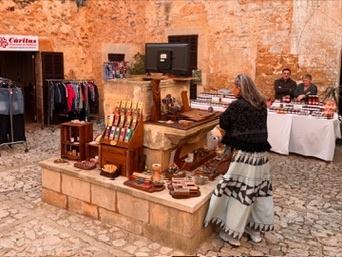What types of local wines pair best with traditional Mallorcan food?
Similar Topics
mallorcan cuisine
local wines mallorcan
manto negro wine
prensal blanc wine
mallorcan rosé
traditional mallorcan food
seafood wine pairing
mediterranean flavors
Mallorcan cuisine, deeply rooted in Mediterranean flavors, pairs beautifully with the island's diverse local wines, which range from robust reds to crisp whites and delicate rosés. Traditional dishes such as tumbet, a vegetable casserole reminiscent of ratatouille, or arròs brut, a hearty rice dish with meats and spices, require wines that complement the subtle complexity of herbs and fresh ingredients. For such meals, a red wine made from the native Manto Negro grape is an excellent choice. This variety typically produces medium-bodied wines with soft tannins, bright acidity, and rich berry and earthy notes, which enhance the rustic flavors without overwhelming them.
For lighter seafood dishes, which are a staple in Mallorcan cooking given the island’s coastal geography, white wines crafted from indigenous grapes like Prensal Blanc (also known as Moll) are ideal. These wines possess a fresh, vibrant acidity and delicate floral and citrus aromas that enliven the palate and harmonize with dishes such as caldereta de llagosta, a lobster stew. The crispness of the white wine balances the natural sweetness and briny quality of the seafood, offering a refreshing contrast that highlights the food’s freshness.
Mallorcan rosé wines also play a pivotal role in pairing with the island’s diverse culinary offerings. Made often with a blend including Manto Negro and other local varietals, these rosés carry enough fruitiness and body to stand up to charcuterie like sobrassada, a spiced cured sausage, and also complement mixed tapas and grilled vegetables. Their bright acidity and subtle tannins make rosé wines versatile companions, able to bridge the gap between richer dishes and lighter fare seamlessly. In sum, the island’s wines, by embracing native grape varieties and crafting styles that reflect local terroir, provide nuanced and authentic pairings that elevate the experience of traditional Mallorcan cuisine.
For lighter seafood dishes, which are a staple in Mallorcan cooking given the island’s coastal geography, white wines crafted from indigenous grapes like Prensal Blanc (also known as Moll) are ideal. These wines possess a fresh, vibrant acidity and delicate floral and citrus aromas that enliven the palate and harmonize with dishes such as caldereta de llagosta, a lobster stew. The crispness of the white wine balances the natural sweetness and briny quality of the seafood, offering a refreshing contrast that highlights the food’s freshness.
Mallorcan rosé wines also play a pivotal role in pairing with the island’s diverse culinary offerings. Made often with a blend including Manto Negro and other local varietals, these rosés carry enough fruitiness and body to stand up to charcuterie like sobrassada, a spiced cured sausage, and also complement mixed tapas and grilled vegetables. Their bright acidity and subtle tannins make rosé wines versatile companions, able to bridge the gap between richer dishes and lighter fare seamlessly. In sum, the island’s wines, by embracing native grape varieties and crafting styles that reflect local terroir, provide nuanced and authentic pairings that elevate the experience of traditional Mallorcan cuisine.
🧩 Related Questions
Related Question
How do local agricultural products impact the authenticity of Balearic dishes?
Related Question
What traditional Mallorcan dishes prominently feature almonds as a key ingredient?
Related Question
What are some traditional festivals in Mallorca that travelers should experience to understand local culture?
